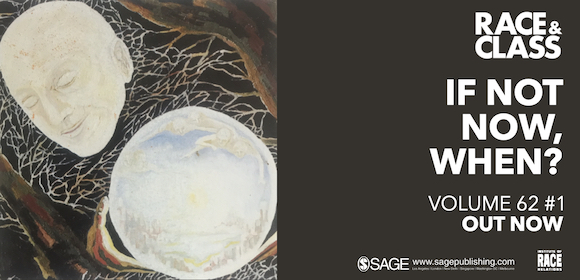Covid 19 has, asserts the July issue of Race & Class, thrown into relief so many key issues: the essential frailty of advanced capitalism, the potential for the state to control the life and death of citizens, the nature of human solidarity and the way in which we desecrate the planet. Now is the time for taking stock.
Race & Class opens with reflections by two radical writers, born in the shadows of the Holocaust and Hiroshima, events which turned the world upside down eight decades ago, to challenge the notions of desecration and of what it is to be human. Jeremy Seabrook, writes in ‘Human resourcefulness in a time of diminishing resources’ of how the depletion of the planet is being replicated in the ‘landscapes of humanity’, calling to us to relearn what real needs are. Exactly what we learn today through lockdown. Peter Pelz comes from another direction in ‘The desk killer and the spider’ a review of Gretton’s I You We them: journeys beyond evil: the desk killer in history and today to speak about communal and individual responsibility for major crimes, again so topical when eugenicist policies beckon.
As newly empowered bureaucracies now, mid-Covid, essentially decide who is to live and who not, the issue of professional collusion in repressive state policies becomes key. This was one of the themes discussed in February 2020 by activists, professionals and academics, at a seminar at the Institute of Race Relations in its series on state racism, health and harm; see ‘Coercion and compliance: the politics of the “hostile environment”’ in the Commentary section. And anthropologist Nanna Dahler, too, in ‘Age estimation of young asylum seekers in Denmark’ examines ‘biometric bureaucracy as imperial control’ and how states manage thereby to depoliticise the questions of dispossession and death.
As Pelz notes, ‘not even the richest are immune’ from this present pandemic. But that does not mean either that it affect us all equally and that we have equal possibilities of surviving it. Those already ‘stigmatised and segregated’ as are the Roma of Udol, Czech Republic, writes Barbora Cernusakova, have pre- and post-Covid 19 had to rely on community networks that have replaced the state, that has effectively written them out already.
Editorial
- If not now, when? by Jenny Bourne
Articles
- Human resourcefulness in a time of diminishing resources by Jeremy Seabrook
- The desk killer and the spider by Peter Pelz
- Biometric imperialism: age estimations of young asylum seekers in Denmark by Nanna Dahler
- Stigma and segregation: containing the Roma of Údol, Czech Republic by Barbora Cernusakova
- The politics of exclusion: embedded racism and Japan’s pilot Refugee Resettlement Programme by Pascale Hatcher and Aya Murakami
- Culture versus class: towards an understanding of Māori poverty by Toon Van Meijl
Commentary
Reviews
- Beyond Coloniality: citizenship and freedom in the Caribbean intellectual tradition by Aaron Kamugisha (Michael Niblett)
- Don’t Stop the Carnival: Black Music in Britain by Kevin Le Gendre (Chris Searle)
View the whole issue online here

